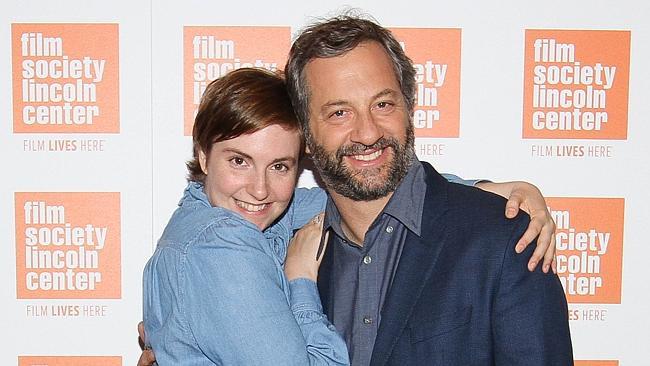Apatow’s ‘Sick in the Head’ records chats with top jokesters
Jerry Seinfeld, Amy Schumer, Lena Dunham and Jon Stewart, among others, relate their experiences to Judd Apatow.

For many, being 15 is about caterwauling over broken hearts and trying to buy beer. For American comic filmmaker Judd Apatow, it marked the beginning of his career. Comedy, and the urge to understand it, consumed him.
As a kid Apatow taped Saturday Night Live on audiocassette and then transcribed it.
“By my 15th birthday,” he writes in Sick in the Head, “my obsession was full-blown. I needed to become one of them. The question was, how to do that? And the answer seemed clear: Meet them. Talk to them. Get to know them, learn their secrets.”
Cut to West Hollywood, 1983. A young Jerry Seinfeld opens the door to his unfurnished apartment, expecting a New York journalist. Instead, he finds a teenage Judd toting an enormous AV Club tape recorder.
Apatow worked for his school radio station, and this was his plan: “I would call [comedians’] agents or PR people and say I was Judd Apatow from WKWZ radio on Long Island and I was interested in interviewing their client. I would neglect to mention that I was 15 years old.” Seinfeld, Apatow recalls, had a “slightly crestfallen” look in his eyes, but he let in the young man. Apatow asked him: “How do you write a joke?”
Apatow started out as a stand-up comedian, opening for Jim Carrey and living with Adam Sandler in Los Angeles. Believing he didn’t have the performer’s “magic fairy dust”, he turned to writing for other comics (notably Roseanne Barr) and later went behind the camera. The resulting films and television shows have made him one of America’s most esteemed comedic creatives: Freaks and Geeks, Knocked Up, The 40-Year-Old Virgin, Superbad, Girls, Bridesmaids and his latest one, Trainwreck, which is in cinemas now. Recently, he returned to stand-up after two decades off the stage.
Throughout this success, Apatow has continued to interview the funny people he admires. Sick in the Head records these conversations, showing the processes, fears and dreams of contemporary comic greats.
Seinfeld — described by Chris Rock as “one of the cockiest bastards to ever live” — “learned very young in this business that you bust your ass or you get thrown out of the kingdom”.
Although comedy was “the thing [he] enjoyed more than anything”, Seinfeld apparently didn’t think he’d be any good. That inspired him to “work harder than most other people”. Even after the success of his eponymous show, he still “gets up every day and writes”.
As the producer of Bridesmaids, executive producer of Girls and producer-director of Trainwreck, Apatow has championed female comic voices. Amy Schumer, writer and star of Trainwreck, tells Apatow that when she performs, “I’m speaking to the women [in the audience] and trying to keep the guys interested enough”. Her message? “You’re doing the best you can and you’re good enough.”
Lena Dunham, the creator and star of Girls, is “one of the few people on earth who [Apatow has] never gotten into a fight with”. Speaking of the cultural impact of her series, Dunham says: “[T]he thing that’s most exciting to me is when men, particularly fathers, tell me that the show has allowed them to understand their wives or daughters better.”
Sarah Silverman, a colleague on The Larry Sanders Show and “one of the most essential comedic minds of her generation”, reveals the genesis of her magnificent profanity: “My dad taught me swears when I was a toddler and I saw, at a really early age, that if I shocked people, I would get approval, and it made my arms itch with glee. I got addicted to it.”
Talk shows hold a unique place in American culture, and Apatow reveres them. For him, “The Tonight Show was the endgame … Sometimes I think movies were just a way to get there.” But former talk show stars Jay Leno and Jon Stewart tell Apatow about the rough edges of their earlier careers.
While doing stand-up at a strip-club Leno “had a guy jump me with a Heinz ketchup bottle … split my head open”. Stewart followed Billy Crystal in front of an audience of 5000. No one laughed: “[I]t was like total silence. Impressive in its discipline. At a certain point you think, like, Doesn’t anyone here have a cold? Isn’t anyone here going to sneeze?” Stephen Colbert explains why comedians persist through these ego-drubbings: “[I]f a thousand people are laughing … That sounds like bacon frying.”
The most intriguing part of Sick in the Head is Apatow’s unflinching exploration of his own insecurities, destructive thinking and anxieties about career and family. That introspection and self-doubt is vital for understanding his aesthetic. “I have a beautiful wife,” he writes, “I’m successful. But I still feel like the kid who’s picked last in gym class. And that shaped my idea of comedy being about outsiders.”
As well as the “dick jokes”, Apatow’s work confronts painful human truths: loneliness and sexual insecurity in The40-Year-Old Virgin (it “perfectly captured my neurosis, how insecure I felt”); the “terror of intimacy, the fear that people will think that you’re a freak” in Freaks and Geeks; the hollowness of fame in Funny People; and the low points of parenthood and marriage in Knocked Up.
“I just want to go deeper,” Apatow writes, “and more personal every time”. Sick in the Head, like his films, achieves that in spades.
James McNamara is a Sydney writer.
Sick in the Head: Conversations about Life and Comedy
By Judd Apatow
Vintage, 512pp, $34.99


